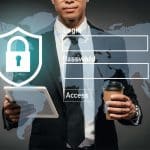Google Workspace gains generative AI

Generative AI is very much flavor of the month at the moment thanks to tools like ChatGPT. Now business tool Google Workspace is getting in on the act with new features to help users create drafts, proofread, generate images and more.
Initially the new AI features will be in Docs and Gmail. The company is keen to stress that users will remain in control, AI will make suggestions that you're able to accept, edit, and change.
New platform helps uncover vulnerable secrets

Complex software today includes components that rely on digital authentication credentials commonly referred to as secrets, which include tools such as login credentials, API tokens, and encryption keys. While critical for the software to function, managing secrets across every component of code is a challenge that can result in secrets being left vulnerable.
Supply chain security company ReversingLabs is launching a new secrets detection feature within its Software Supply Chain Security (SSCS) platform.
95 percent of business leaders expect AI/ML investments to boost revenue

A new survey of 100 chief data officers (CDOs) and chief data analytics officers (CDAOs) at companies with $1B+ in revenue shows that 95 percent say their company leadership expects investments in AI and ML applications will result in a revenue increase.
The study for Domino Data Lab, carried out by Wakefield Research, shows 67 percent are adopting a more offensive data policy seeking to drive new business value with analytics, ML and AI applications.
Consumers turn to biometrics as they struggle to remember passwords

People are struggling to recall an ever-growing number of passwords, with 51 percent of respondents to a new study by Entrust saying they reset a password at least once a month because they can't remember it.
Even more alarming, 15 percent of users who responded reset passwords at least once a week. It's no surprise then that given the option between biometrics or a password, 74 percent of respondents will choose biometrics half the time or more and a third will always choose biometrics when available.
Want cheap broadband? Head for Sudan

Analysis of data on over 3,700 broadband packages from 219 countries around the world shows that if you want the cheapest deal you should consider moving to Sudan.
The study by Cable.co.uk shows Sudan offers the world's cheapest broadband, with an average cost of $2.30 per month. By contrast another African nation, Burundi, is the most expensive place in the world to get fixed-line broadband, with an average package price of $383.79 per month.
Over 700 million credentials exposed and 22 million devices infected in 2022

The latest Identity Exposure Report from SpyCloud shows that last year its researchers recaptured 721.5 million exposed credentials from the criminal underground, and found over 22 million unique devices infected by malware.
Of the exposed credentials recovered by SpyCloud, roughly 50 percent came from botnets, tools commonly used to deploy highly accurate information-stealing malware. These infostealers enable cybercriminals to work at scale, stealing valid credentials, cookies, auto-fill data, and other valuable information to use in targeted attacks or sell on the darknet.
How software pricing strategy is evolving [Q&A]

Buying software used to be relatively simple. You either paid a one-off fee, or an ongoing license, or sometimes a combination of both.
With the advent of cloud and SaaS, however, things have become rather more complicated. Usage based pricing is more common, plus in a difficult economic climate there's a spotlight on software costs.
The rise of hardware-based security and why it matters [Q&A]

Cybersecurity is usually viewed as something to be addressed via software. In recent years though we've seen a hardware element start to creep in -- Windows 11's requirement for TPM capability for example.
Can we expect to see more hardware-based security measures? And what benefits do these offer? We spoke to Ed Maste, senior director of technology at the FreeBSD Foundation (the non-profit organization supporting the open source FreeBSD operating system) to find out.
21 percent of government workers don't care if their organization is hacked

With 70 percent of government workers reporting that they work virtually at least some of the time, a new survey shows some worrying trends.
The report from Ivanti finds five percent of government workers have fallen victim to a phishing attempt. However, 34 percent don't believe their actions impact their organization's ability to stay safe.
93 percent of organizations suffer business email compromise attacks

The threat of business email compromise (BEC) is growing year on year and is projected to be twice as high as the threat of phishing in general.
According to a new report from cloud email security platform IRONSCALES, over 93 percent of organizations have experienced one or more of the BEC attack variants in the previous 12 months, with 62 percent facing three or more attack variants.
Wanna know a secret? Ask a developer

Secrets are not just login credentials and personal data; they securely hold together the components of the modern software supply chain, from code to the cloud. And because of the leverage they provide they are much sought-after by hackers.
However, many breaches that occurred in 2022 show how inadequate the protection of secrets is. Research from automated detection specialist GitGuardian finds that one in 10 code authors exposed a secret in 2022.
QuSecure pioneers quantum-resilient satellite link

Much of our modern communication relies on satellites, but the data sent between them and ground stations is vulnerable to theft, leaving satellite communications even more accessible than typical internet communications.
Post-quantum cybersecurity company QuSecure has announced that it's achieved an end-to-end quantum-resilient cryptographic communications satellite link.
1Password introduces one-click login for enterprise users

Password service 1Password is launching a new service that will allow enterprise customers to unlock their 1Password accounts using third-party identity services.
Unlock with Single Sign-On (SSO) automatically provisions and deprovisions employees, with streamlined deployment through the bridge connection for the 1Password SCIM (System for Cross-domain Identity Management).
New UK privacy laws aim to cut red tape for business

The UK's new Data Protection and Digital Information Bill is set to reduce costs and burdens for British businesses and charities, and remove barriers to international trade.
We know from when it was first brought before parliament last summer that it will also cut the number of repetitive data collection and cookie pop-ups online.
Economic uncertainty puts the focus onto cloud costs

This year marks the first time in more than a decade that managing cloud spend has overtaken security as the top challenge facing organizations, according to the latest State of the Cloud report from Flexera.
The report is based on responses of 750 respondents from a survey conducted in late 2022 and finds optimizing existing use of the cloud (cost savings) is the top initiative (reported by 62 percent of all respondents).
Ian's Bio
Ian spent almost 20 years working with computers before he discovered that writing about them was easier than fixing them. Since then he's written for a number of computer magazines and is a former editor of PC Utilities. Follow him on Mastodon
© 1998-2025 BetaNews, Inc. All Rights Reserved. About Us - Privacy Policy - Cookie Policy - Sitemap.
